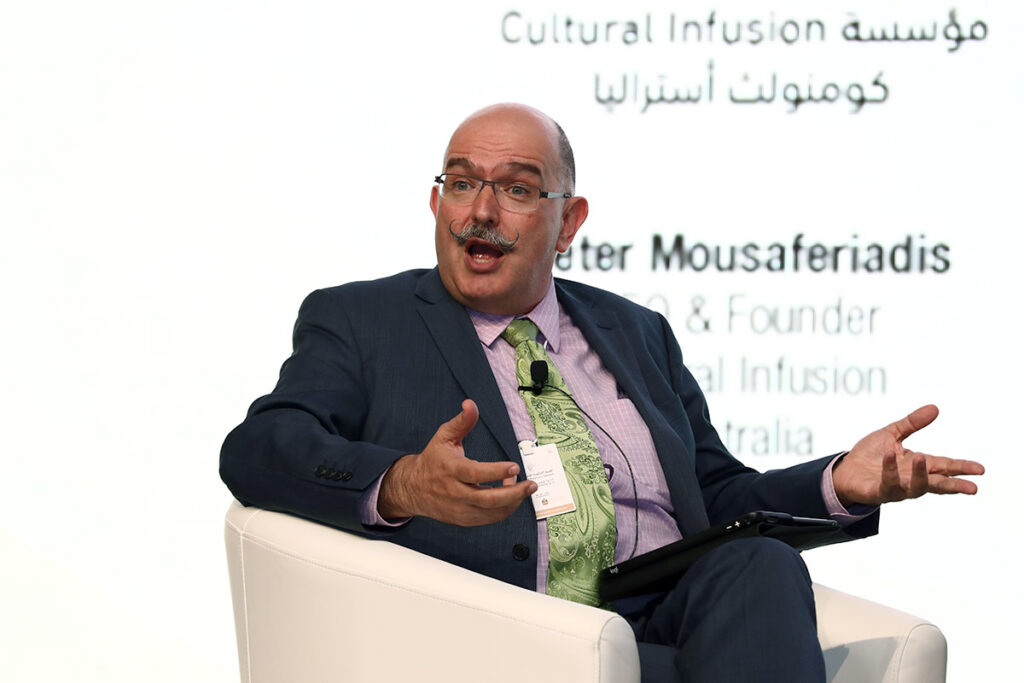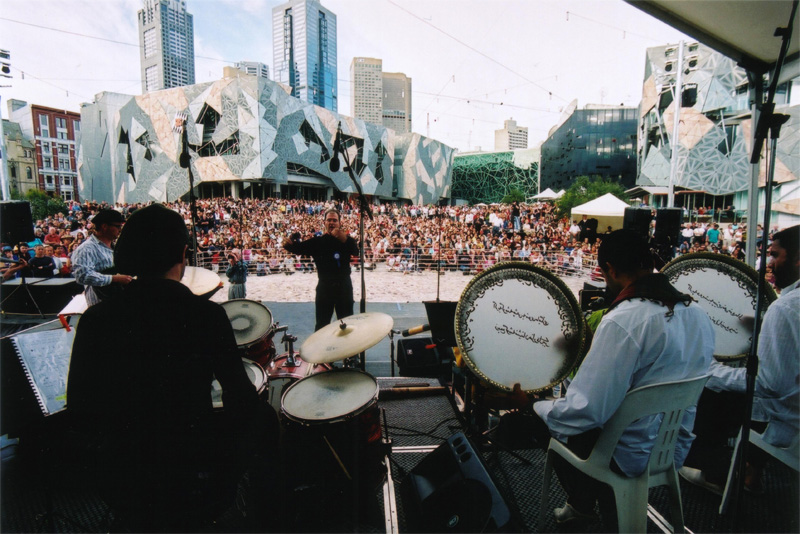This section presents visionary grassroots leaders who have dedicated their life, their personal and professional engagement to promote understanding among people and cultures. Our first guest is Peter Mousaferiadis, the founder and CEO of Cultural Infusion in Melbourne.

Peter: tell us briefly about yourself, who you are, where you are from, what have been your sources of inspiration
In many parts of the world, I’m known as ‘the traveller’. Every year I spend between 3 and 5 months travelling the globe. Yet, regardless of my profession or how far I travel, I remain in the same place: that point where societies and cultures overlap and diverse perspectives collide to create something new. That ancient meeting-place we have come to know as confluence.
Our greatest, yet least utilised, asset is our cultural diversity, a realisation I gained through my early career as a conductor, composer and creative director presenting shows across the world, including nine Australia Day concerts.
Was it coincidence that variations of my name ‘Mousaferi(adis)’ literally mean ‘traveller’ or ‘visitor’ in more than another 1000 languages and speech communities including Uzbek, Greek, Turkish, Arabic, Urdu, Swahili, Persian and Hindi, or was I genetically predisposed to be a traveller?
The name ‘Mousaferiadis’ was given to my grandfather who loved to travel and visit people. My grandfather was exiled from the Ottoman Empire in 1923 from the region of Cayseri where once upon a time a Hittite queen ruled.
Recently on a train in United Arab Emirates I met a Bahraini/Saudi Arabian/Qatari PhD student, who told me the word ‘musāfir’ means so much more than just ‘traveller’.
Every semitic word comprises a stem or root of three letters. ‘Sfr’ pronounced ‘safar’ or ‘safir’ is the root of the word ‘musāfir’. In the book Changing Theory: Concepts from the Global South (Routledge India, 2022, edited by Dilip M Menon), Mahvish Ahmad writes of the word’s importance as a concept. She cites the following definitions from Hans Wehr’s Arabic-English Dictionary: ‘unveiling, shining, glowing, disclosing, achieving, ending and bringing to a close. Or, that moment when something is revealed.’ She further cites the Qu’ran, where the ‘sfr’ letter combination refers both to travel and to the act of unveiling, brightening or bringing light to a matter or object.
In other words, deeply embedded in the etymology of my name is a dual concept of journey and enlightenment that goes way beyond the English word ‘travel’. I am only now coming to realise the word’s importance as a concept and how often it is referenced in the great literatures of Asia and Africa. Could this powerful name, so central to my identity, have been guiding my path?
What was the idea behind Cultural infusion?
When I founded Cultural Infusion in 2002 it was with the intention to build global harmony through intercultural action, working across multiple sectors: arts, technology, education, youth, communities, government and business. Since then, we have produced major intercultural experiences and events, with clients including the Parliament of the World’s Religions and the United Nations.
How does Diversity Atlas fit the vision?
Diversity Atlas is a data-driven approach answering the same needs, which have only become more pressing in the last twenty years, namely: meeting the challenges around sustainability and social justice through intercultural action. We invested 7+ years of RnD and harnessed state of the art technology and innovative thinking to design the unique, comprehensive survey tool that is Diversity Atlas. Today, some of the largest corporations in the world are engaging Diversity Atlas to provide them with baseline data that ensures each person in their organisation is as seen and included in their full humanity as they wish to be. Through the efficacy of the technology, we equip companies to build a range of targeted and nuanced strategies to unlock untapped potential, build intercultural proficiency within their workforce and create cultural, social and economic value. Diversity Atlas is underpinned by the most comprehensive database of humanity ensuring no one feels invisible and otherised.

What was the catalyst?
I remember being a kid growing up in the Western suburbs of Melbourne – a hub of different migrants in the 70s. My parents had this milk bar, this corner store. And most of the people that came to this milk bar didn’t speak English, they were recent arrivals. People would ask how I was, and I’d put my thumbs up at them, meaning, good. I responded like that. This led to my first cross-cultural misunderstanding.
A Serbian person who had just arrived from the Balkans, after I put my thumb up at him on the street, quickly got off his bike and wanted to have a go at me. And I was so scared. I didn’t know what had happened. It turned out that in his culture, putting your thumb up is a terrible insult.
My childhood was the introduction for me into cultural diversity, being surrounded by so many people from so many different parts of the world who saw things in different ways.
It wasn’t just that, however, it was also witnessing my parents being victims of discrimination based on their Greek migrant identity. They had taken over this corner store from an Anglo-Australian family who had been there for 20 years. My parents’ front window was broken many times by people disapproving of the idea of a Greek rather than Anglo family running the milk bar. Insurance companies wouldn’t cover my parents. I saw all this and felt the impact it had on us to be othered and discriminated against.
More importantly, as I embarked on a career as a conductor, composer and creative director, I began to realise that cultural diversity is an underutilised resource, a resource capable of driving quality education programmes, reducing poverty and building sustainable, cohesive and peaceful communities. And as a great driver for innovation.
Why have you dedicated your life to this?
Culture is overarching and underpinning. Every society has a culture. A way of thinking. A way of behaving. Social norms. All these guide society. If you want social change you need to change culture; in other words, social change is embedded in cultural change.
Now, a not so well-known statistic. According to UNESCO, 75% of all the conflict we have in the world has a cultural dimension. And according to the Global Peace Index, established by Australian philanthropist Steven Killelea, the cost of conflict in the world equates to almost 14% of the world’s GDP. It doesn’t take much to work out that the world is therefore spending more than 10 trillion dollars a year dealing with conflict that has a cultural dimension. Think about that for a moment. Ten trillion dollars spent dealing with conflict that has a cultural dimension.
So the question to everyone is, why are we not re-envisioning societies to put culture at the heart of all education, development and progress?
The lifeblood of culture is confluence. Convergence. Cultures need to keep reinventing themselves.
I have long been actively involved in various intercultural, interfaith and other peace-building initiatives. I have been involved in projects that leverage technology to enhance the human experience.
Stories have emotions – data doesn’t. I am dedicated to answering the question: how do we bridge this divide? Now that we have the capacity to understand why people behave the way they do, how can we begin to motivate behavioural change on a global scale? I believe we can all learn to be kind to each other by respecting the humanity in every individual. Is it my name that drives my unyielding passion to understand and ultimately share the collective knowledge and wisdom of the world? It’s not easy flying across the world and spending months on end couped up in hotel rooms. It’s the compromise I make to genuinely make a difference in the world.
 The Global Compass Innovative Solutions to Navigate a Complex World
The Global Compass Innovative Solutions to Navigate a Complex World